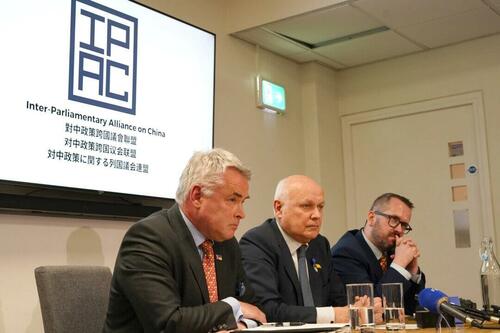Authored by James Gorrie via The Epoch Times,
The cybersecurity wars between communist China and the West are raging, yet few people realize what’s really going on. That’s now changing.
The Chinese regime’s ability to launch successful cyberattacks against American and British defenses is higher than it has ever been. New attack tactics, techniques, and protocols (TTPs) developed by the Chinese Communist Party’s (CCP’s) cyber division are threatening the integrity and functionality of Western nations’ military communications, operations, and other critical systems.
(L to R) MP Tim Loughton, Sir Iain Duncan Smith, and MP Stewart McDonald during a press conference at the Centre for Social Justice in central London on March 25, 2024. The Chinese regime is believed to have targeted a group of senior MPs and peers with a fresh series of cyberattacks aimed at undermining UK democracy. (Jordan Pettitt/PA Wire)
That may be why the United States and the UK are now publicly speaking about these critical threats, warning the Chinese and other national threat actors with which they coordinate to cease these provocative attacks. To that point, American, British, and European officials have warned that the Chinese regime’s cyberattacks are both coercive and destabilizing. As an indication of just how serious those threats are, the UK summoned the Chinese ambassador as a formal response to the regime’s increasing cyber threats to the UK.
UK: Defending Against China’s Cyberattacks Is ‘Top Priority’
To underscore their concern, Anne Keast-Butler, director of the Government Communications Headquarters (GCHQ), the UK’s top-tier surveillance agency, said at a security conference in England’s city of Birmingham that responding to China’s cyber activities was “a top priority” for GCHQ. This isn’t the first time the UK government has had to confront Beijing about its illegal and threatening activities in cyberspace, but of late, it’s become a much bigger problem.
In fact, last month, British Prime Minister Rushi Sunak said Chinese hackers working for the CCP were running “malicious cyber campaigns” against UK lawmakers and UK media and were also responsible for a hack on the British Armed Forces’ payments system. The prime minister spoke further about the cyber threats, saying his country faced an “axis of authoritarian states like Russia, Iran, North Korea, and China.”
What’s more, British authorities have charged three men with spying for Hong Kong’s foreign intelligence service in the UK. The men are accused of being Chinese state-sponsored hackers and stealing election data from the UK’s elections offices, as well as performing surveillance operations in the UK. Beijing stated that the case was “a fabrication.” When pressed about these and other cyber activities and the threats they pose to international norms and the security of the United States, the UK, and European countries, Beijing denied the existence of such threats, dismissing them as “absurd.”
These events put additional strains on UK relations with China.
The Volt Typhoon Threat and Beyond
These official accusations follow in the wake of the confrontation that Washington had with Beijing several weeks ago regarding its advanced “Volt Typhoon” attack. That attack involved the discovery of the long and undetected presence of Chinese infiltration into vital U.S. operational systems across a variety of verticals. It was determined that Chinese attackers had breached the networks of dozens of American critical infrastructure organizations that control electrical power, water, and both civilian and military communication systems via a widespread network of compromised servers and computers.
FBI Director Christopher Wray contends that Volt Typhoon would be used to disrupt, if not eliminate, control of the critical infrastructure systems mentioned above, as well as other strategic assets, prior to launching a military campaign against the United States or Taiwan. Again, Beijing has denied any official connection to the Volt Typhoon attack.
Hackers Penetrating US Defense Systems
However, at the Birmingham security conference, National Cyber Director Harry Coker asserted that Chinese hackers were violating U.S. defense sites in cyberspace and targeting U.S. interests at an “unprecedented scale.” Mr. Coker highlighted the severity of this threat, noting that “in a crisis or conflict scenario, China could use their pre-positioned cyber capabilities to wreak havoc in civilian infrastructure and deter U.S. military action.”
The British prime minister and the GCHQ chief emphasized their rising concerns about China’s cyberattacks and their impact on the global order. Mr. Sunak said the next few years would be “dangerous and transformational,” while Ms. Keast-Butler said that “Russia and Iran pose immediate threats, but China is the ‘epoch-defining’ challenge.”
As China’s Power Rises, So Do Attacks
However, the United States, the UK, and Europe aren’t the only targets of Chinese hackers. The Philippines has seen a fourfold rise in Chinese cyberattacks year over year as friction between the two has increased. The parallel between the Chinese regime’s growing military power and influence in the world and its rising level of cyberattacks against its adversaries can’t be overlooked. Nor can the fact that the United States and the UK feel the need to publicly point the finger at China.
Cyberattacks have occurred for decades, but this is a clear change from how they were handled in the past, when they were managed at the government level. However, with China’s apparent ability to penetrate even the most highly guarded systems, the next few years may well be, as the British observed, “destabilizing,” “transformative,” and “epoch-defining.”
Views expressed in this article are opinions of the author and do not necessarily reflect the views of The Epoch Times or ZeroHedge.
